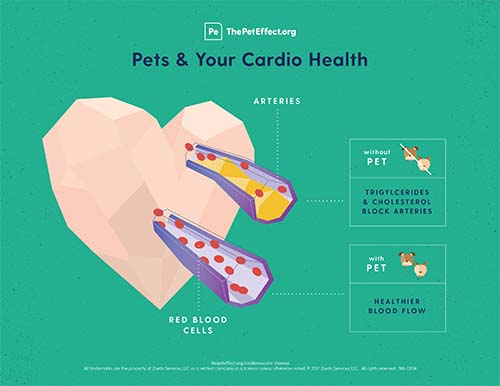September is Happy, Healthy Cat Month. Founded by the CATalyst Council, this month is an opportunity to celebrate the roles of pet cats and take action to improve their well-being. One in four American households includes a pet cat, with many having more than one. In fact, more than 40 million households house upwards of 90 million cats, according to the APPA Pet Owner’s Survey.
Scientific research shows that cat ownership can improve both mental and physical health in their owners. Survey research also suggests that when people are made aware of the scientific health benefits of pets, they are more likely to take better care of their pets, such as keeping up with veterinary visits and providing their pets with better nutrition.
To recognize Happy, Healthy Cat Month, HABRI created a shareable infographic highlighting the scientifically-documented benefits of cats to our health and wellness. Below are some examples of how the human-cat bond has been shown to benefit human health. Please share the infographic to be an advocate for happy, healthy cats!
Physical Health
Cat ownership can benefit the physical health of people of all ages. Evidence suggests that keeping a cat in the home can help bolster the immune system of young children by protecting against allergens. According to a study involving over 3,000 first and second grade children, owning a cat may be protective against asthma. Experts attribute this to the ‘mini-farm’ effect, where companion animals introduce new microbes or other immunoregulatory factors to the household that promote positive immune development.
Heart health is so important for healthy aging. Keeping blood pressure low and reducing stress are important for maintaining good cardiovascular health. According to scientific research, cat ownership is associated with reduced stress, which is good for both mental health and heart health. In a study of 240 couples, including cat owners and non-owners, researchers found that cat owners had lower baseline heart rate and blood pressure levels compared to non-owners, had less severe reactions to stress, and also experienced faster recovery from stress. The study concludes that these benefits stem from owners viewing their pet cats as important, supportive parts of their lives. In a study of dog and cat owners age 50-83 with hypertension, the presence of a pet was found to be associated with lower blood pressure, suggesting that cats (and dogs) may be effective in helping slow the development or progression of hypertension in older adults. Results of a separate study found that cat ownership had a moderating effect on heart rate and blood pressure, contributing to a decreased overall risk of death due to a heart attack or other cardiovascular events such as stroke. The study authors even concluded that acquiring a cat may be a novel strategy to reducing the risk of cardiovascular disease in high-risk individuals.
Mental Health
Interaction with cats can positively influence mental health. A study using survey data of over 3,000 Scottish adolescents found that stronger attachment to pets was positively associated with higher quality of life. Positive mental health benefits of cat ownership continue through adulthood. Cat owners have been found to laugh more frequently and spontaneously than non-owners. Oxytocin, commonly known as the bonding hormone, has been linked to the many observed physiological effects of the human-animal bond. Research suggests that simple, sustained interactions, such as gently petting a pet cat, is enough to activate oxytocin in the brain. When released in the brain, oxytocin can also promote improved pain management, reduced aggression, enhanced empathy and improved learning. Similar research conducted has also shown that petting an animal, such as a cat, for a short period of time reduces state-anxiety.
The perception of cats as strong sources of social and emotional support may explain why cat ownership has been found to reduce social isolation and loneliness in owners. When asked to visualize the role of their pet in their own social network, the majority of pet owners managing a long-term mental health condition would place their pet in a central, valued position, suggesting people see their pets as main, rather than marginal or supplemental, sources of support.
In a study of homebound older adults who live alone, cat ownership was found to reduce depressive symptoms even further than dog ownership in the same population. In a study of 398 homeless youth (22 percent of which owned a cat), participants reported their pet kept them company and made them feel loved; and reported fewer symptoms of depression and loneliness compared to homeless youth who did not own pets. Additionally, survey data from Summer 2020 conducted by Banfield Pet Hospital found that almost half of pet owners said spending more time with their pets increased their household’s happiness during periods of self-isolation and social distancing.
Resources for Cat Owners (and Future Cat Owners)
If you’re interested in reading more about how you can provide the best life for your current or future feline friends, please see this collection of resources from HABRI’s supporters dedicated to improving the happiness and welfare of pet cats:
American Veterinary Medical Association
CATalyst Council
Banfield Pet Hospital
Royal Canin
WhiskerDocs
Zoetis Petcare
To stay informed on the latest human-animal bond news and research, please sign up for the HABRI Newsletter or follow us on Facebook, Twitter, Instagram and LinkedIn.





